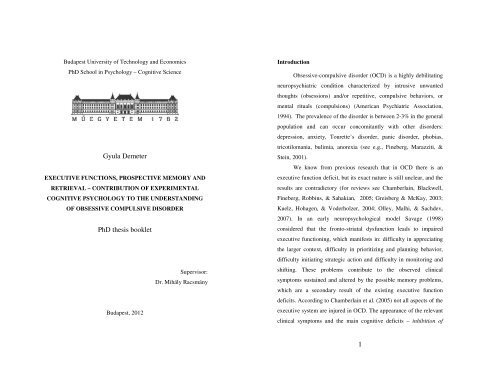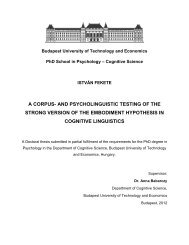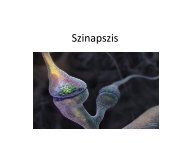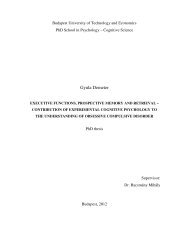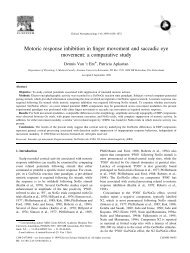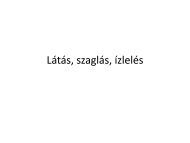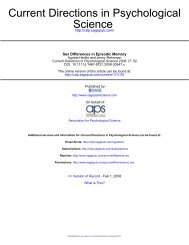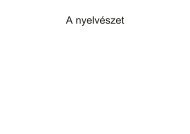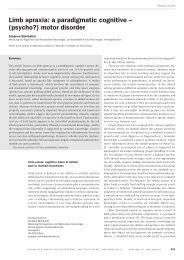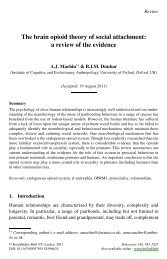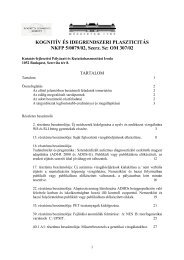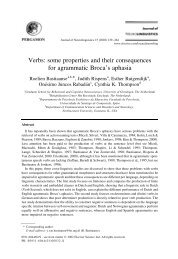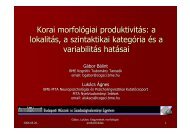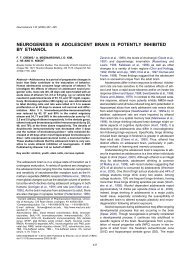Gyula Demeter PhD thesis booklet 1
Gyula Demeter PhD thesis booklet 1
Gyula Demeter PhD thesis booklet 1
Create successful ePaper yourself
Turn your PDF publications into a flip-book with our unique Google optimized e-Paper software.
Budapest University of Technology and Economics<br />
<strong>PhD</strong> School in Psychology – Cognitive Science<br />
<strong>Gyula</strong> <strong>Demeter</strong><br />
EXECUTIVE FUNCTIONS, PROSPECTIVE MEMORY AND<br />
RETRIEVAL – CONTRIBUTION OF EXPERIMENTAL<br />
COGNITIVE PSYCHOLOGY TO THE UNDERSTANDING<br />
OF OBSESSIVE COMPULSIVE DISORDER<br />
<strong>PhD</strong> <strong>thesis</strong> <strong>booklet</strong><br />
Budapest, 2012<br />
Supervisor:<br />
Dr. Mihály Racsmány<br />
Introduction<br />
Obsessive-compulsive disorder (OCD) is a highly debilitating<br />
neuropsychiatric condition characterized by intrusive unwanted<br />
thoughts (obsessions) and/or repetitive, compulsive behaviors, or<br />
mental rituals (compulsions) (American Psychiatric Association,<br />
1994). The prevalence of the disorder is between 2-3% in the general<br />
population and can occur concomitantly with other disorders:<br />
depression, anxiety, Tourette’s disorder, panic disorder, phobias,<br />
tricotilomania, bulimia, anorexia (see e.g., Fineberg, Marazziti, &<br />
Stein, 2001).<br />
We know from previous research that in OCD there is an<br />
executive function deficit, but its exact nature is still unclear, and the<br />
results are contradictory (for reviews see Chamberlain, Blackwell,<br />
Fineberg, Robbins, & Sahakian, 2005; Greisberg & McKay, 2003;<br />
Kuelz, Hohagen, & Voderholzer, 2004; Olley, Malhi, & Sachdev,<br />
2007). In an early neuropsychological model Savage (1998)<br />
considered that the fronto-striatal dysfunction leads to impaired<br />
executive functioning, which manifests in: difficulty in appreciating<br />
the larger context, difficulty in prioritizing and planning behavior,<br />
difficulty initiating strategic action and difficulty in monitoring and<br />
shifting. These problems contribute to the observed clinical<br />
symptoms sustained and altered by the possible memory problems,<br />
which are a secondary result of the existing executive function<br />
deficits. According to Chamberlain et al. (2005) not all aspects of the<br />
executive system are injured in OCD. The appearance of the relevant<br />
clinical symptoms and the main cognitive deficits – inhibition of<br />
1
prepotent responses, set shifting and strategy use in memory probes –<br />
could be explained by failures of cognitive and behavioral inhibition.<br />
The neuroimaging studies support the involvement of the lateral and<br />
medial orbitofrontal cortex, the dorsal anterior cingulated cortex and<br />
the amygdale in OCD symptomatology (for review see Milad &<br />
Rauch, 2012).<br />
We think that executive functions play an important role in the<br />
realization of delayed intentions, in prospective memory (PM)<br />
performance. Many factors – such as motivation, stress, the<br />
properties of the PM cues, the characteristics of the ongoing task,<br />
planning and individual differences – influence the successful<br />
performance on PM tasks. In case of memory retrieval there is an<br />
impressive amount of data demonstrating that interference also plays<br />
an important role in forgetting (see e.g., Anderson & Neely, 1996).<br />
According to Anderson (2003) the need to resolve interference<br />
during retrieval induces executive control processes that overcome<br />
interference through inhibition of the interfering non-target memory.<br />
Executive function is an umbrella term and during our studies<br />
we focus on two main components that we consider critical in OCD:<br />
set shifting and inhibition. We want to find and answer to the<br />
questions: “If there is an executive function impairment regarding<br />
these main components, how is its pattern of distribution in the<br />
clinically impaired ranges and how does the severity of symptoms<br />
relate to the different neuropsychological scores?”<br />
As far as we know, we are the first group trying to connect<br />
executive impairment with PM function deficits in a clinical sample<br />
2<br />
of OCD patients in a series of experimental studies. Our second main<br />
question refers to this topic: “Is there a PM deficit in OCD and if so<br />
how can we interpret the findings and connect them to<br />
symptomatology?” We hypothesize that OCD patients will manifest<br />
extra monitoring activity in event-based PM tasks due to the<br />
overactivity of the PM system. This will result in increased reaction<br />
times in the ongoing and PM tasks and more false alarm type errors<br />
on the PM task.<br />
Our third guiding question group is related to the topic of<br />
episodic memory retrieval using the retrieval practice procedure: “Is<br />
the retrieval induced forgetting (RIF) a short or a long term effect,<br />
and what factors modulate its persistence or diminishment?; “Is this<br />
effect present in OCD?”; “How is affected by symptom severity,<br />
working respective short term memory capacity and anxiety?”. We<br />
hypothesize that if there is no active rehearsal the RIF effect will<br />
persist also after 12 hours and that sleep may play a critical role here.<br />
The diminished RIF effect in OCD could be attributed to the<br />
dysfunction of conflict detection processes observed in this disorder.<br />
The <strong>thesis</strong> tries to find answers to the above questions in four<br />
main <strong>thesis</strong> points: <strong>thesis</strong> I is related to executive functions, <strong>thesis</strong> II<br />
to PM and theses III and IV to episodic memory retrieval.<br />
3
Main goals<br />
1. To assess the level of short term memory and executive<br />
functions in OCD compared to healthy control subjects.<br />
2. To describe the distribution of patients in different<br />
impairment ranges regarding short term memory, shifting<br />
and inhibition.<br />
3. To clarify the relationship between symptom severity and<br />
cognitive impairments in OCD.<br />
4. To demonstrate PM impairment in a series of event-based<br />
PM tasks compared to healthy control subjects.<br />
5. To clarify the relationship between symptom severity,<br />
subjective evaluation of memory performance and error<br />
patterns during event-based PM tasks in OCD.<br />
6. To demonstrate the long term effect of selective retrieval<br />
practice in normal population.<br />
7. To compare OCD patients and normal subjects’<br />
performance in a modified retrieval practice paradigm.<br />
4<br />
New scientific results<br />
Thesis I: Impaired executive functions in OCD<br />
OCD patients show impaired performance on the shifting and<br />
inhibition component of the executive system measured by the<br />
Wisconsin Card Sorting Task (WCST) respective Stroop Task.<br />
Patients with more severe symptoms committed significantly more<br />
perseverative errors on the WCST.<br />
Earlier neuropsychological studies with tasks tapping short<br />
term memory and executive functions in OCD have produced<br />
inconsistent results (for reviews see Chamberlain et al., 2005;<br />
Greisberg & McKay, 2003; Kuelz et al., 2004; Olley et al., 2007).<br />
This could be attributed to the facts that the executive system is not<br />
unitary and the different methods used to evaluate executive<br />
functions require different cognitive processes. According to Miyake<br />
and collaborators (2000) traditional neuropsychological executive<br />
tasks load on three main central executive components: inhibition,<br />
modality specific updating-monitoring and shifting.<br />
In our study (Study 1) the OCD group performed within the<br />
range for healthy adults in the short term memory tasks (Digit Span<br />
Forward and Backward Tasks, Corsi Block Tapping Task), while<br />
they produced severely impaired performance in executive tasks<br />
assessing shifting (WCST) and inhibition (Stroop Task). The<br />
increased reaction times on the interference condition in the Stroop<br />
task as well as the higher number of perseverative errors in WCST<br />
could be interpreted as a consequence of impaired inhibitory<br />
5
mechanisms. We argue that set-shifting also requires the ability to<br />
inhibit previously acquired rules, a process mediated by the<br />
orbitofrontal cortex (Chamberlein et al., 2005). There is also a<br />
relation between symptom severity and performance scores, patients<br />
with more severe symptoms committed more perseverative errors on<br />
the WCST. Our findings support the view that the updating<br />
component of the executive system seems to be intact in OCD while<br />
the inhibition and shifting components are altered.<br />
Thesis II: Impaired PM functions in OCD<br />
OCD patients PM function is impaired compared to healthy subjects.<br />
PM instruction produced a significantly cost effect in OCD patients<br />
during the ongoing task due probably to an extra over-monitoring<br />
activity for PM cues.<br />
OCD patients commit significantly more false alarm type errors in a<br />
modified event-based PM task compared to healthy controls<br />
probably due to an overactivity of the PM system and the<br />
desinhibition of the activated inadequate responses. The patients who<br />
consider their PM performance poorer commit significantly more<br />
false alarm type errors.<br />
There are just a few studies with OCD patients or with<br />
subclinical groups characterized by dominant checking symptoms or<br />
obsessive tendencies in the domain of PM research (see e.g., Cuttler<br />
& Graff, 2009; Harris, Vaccaro, Jones, & Boots, 2010; Jelinek,<br />
Moritz, Heeren, & Naber, 2006; Marsh, Jameson, Cook, Amir, &<br />
6<br />
Hicks, 2009). In two consecutive experiments (Study 2 and Study 3)<br />
we have demonstrated the impairment of PM functions in event-<br />
based task in OCD, and contrary to previous interpretations we argue<br />
by an overactivity of the PM system.<br />
In our first experiment (Study 2) we found that OCD patients<br />
slowed down on the ongoing task in both the expectation condition<br />
(in which participants were told that PM stimuli might occur but<br />
none actually did) and execution condition (in which participants<br />
were told that PM stimuli might occur and they did) compared to<br />
baseline. We propose the occurrence of extra monitoring activity as<br />
probable cause for this finding. The PM instruction produced an extra<br />
monitoring activity for OCD patients that resulted in a more active<br />
search for PM cues. The higher latency and lower accuracy scores in<br />
the experimental trials compared to the control trials are evidence of<br />
monitoring activity (see Guynn, 2003; Kliegel, Martin, McDaniel, &<br />
Einstein, 2004).<br />
In our second experiment (Study 3) a modified PM task was<br />
used with minimal memory load suitable for patients under<br />
medication and with the goal of simulating a real life situation, where<br />
following a successful response to a relevant target, the response<br />
must be inhibited for the same target on the next encounter with it.<br />
This task compared to our previous experiment required a more<br />
intense monitoring activity from subjects concerning their own<br />
actions, making it appropriate for analyzing the monitoring activity<br />
through reaction times and errors made. We have found not just<br />
similar data regarding reaction times with our previous experiment,<br />
7
ut also significant differences in error patterns. The significantly<br />
higher rate of false alarm type errors may reflect the overactivity of<br />
the PM system and also a response inhibition deficit (Chamberlain et<br />
al., 2005). We argue that overactivated PM intentions go together<br />
with a response inhibition deficit, and that these two factors together<br />
contribute to the higher rate of false alarms. Another important result<br />
supporting our view is that patients who achieved higher scores on<br />
the PM subscale of the Prospective and Retrospective Memory<br />
Questionnaire (PRMQ) made significantly more errors on the PM<br />
task. Taking together the hit rates on the PM task and the reaction<br />
time scores on the ongoing task in the execution condition, it can be<br />
concluded that OCD patients’ performance can be explained by over-<br />
monitoring for PM cues.<br />
Thesis III: Long-term effects of retrieval practice<br />
Retrieval practice effects were found to persist over a 12 hour<br />
retention interval when the items were maintained in memory by<br />
frequent rehearsal or when a period of nocturnal sleep occurred<br />
during the retention interval. When rehearsal was reduced or did not<br />
occur, long-term RIF was present only following a full period of<br />
sleep. It is proposed that consolidation processes occurring during<br />
sleep, possibly featuring off-line elaborative rehearsal, mediate this<br />
long-term effect of retrieval practice.<br />
Inhibition could explain why we forget previously studied<br />
items while we retrieve some items from memory, a phenomenon<br />
8<br />
known as the RIF (Anderson, Bjork, & Bjork, 1994). This<br />
phenomenon was often studied with the retrieval practice paradigm<br />
(Anderson, et al., 1994). In today’s memory research there is still an<br />
active debate about how we can overcome interference and resolve<br />
competition between similar traces when retrieving specific target<br />
memories (see e.g., Anderson, 2003; Camp, Pecher, & Schmidt,<br />
2007). Researchers consider the retrieval practice effect a short rather<br />
then a long term effect (see e.g., Saunders & MacLeod, 2002). We<br />
know that the operation processes operating during sleep play a<br />
crucial role in the consolidation of episodic memories (see e.g.,<br />
Conwey, 2009) but it is still unclear if the suppression effects due to<br />
selective practice are lasting for seconds, creating just a short term<br />
reduction in the activity level of competing responses or are long<br />
term effects, which determines the durable accessibility of items<br />
from memory. We think that this is an important aspect in the<br />
understanding of OCD symptomatology.<br />
We have demonstrated that the RIF effect persists in long term<br />
in healthy subjects after 12 hours if there is no active rehearsal and a<br />
period of nocturnal sleep is included before the surprise delayed<br />
recall (Experiment 1, Study 4). In the absence of rehearsal the<br />
retrieval-practice effects began to dissipate after a retention period of<br />
just 1 hour (Morning no-sleep group, Experiment 2, Study 4). In one<br />
experiment just mentioned in our study we found that if there is<br />
rehearsal during the retention interval, then retrieval practice effects<br />
will be present also after 12 hours (with no period of sleep).<br />
According to the episodic inhibition account (Racsmány & Conway,<br />
9
2006) in the retrieval practice paradigm the study of item pairs gives<br />
rise to the formation of an episodic memory and the practice phase<br />
establishes a pattern of activation and inhibition over these<br />
memories. On the final recall then this pattern of activation-inhibition<br />
will mediate access to memories. It seems likely that the opportunity<br />
for interference by new memories was greater in our no-sleep than in<br />
our sleep-groups, and, consequently, integration may have been<br />
attenuated in the no-sleep relative to the sleep groups. We can<br />
conclude that the greater degree of integration of memories in the<br />
sleep groups underlies the observed retrieval practice effects.<br />
Thesis IV: No retrieval induced forgetting (RIF) in OCD<br />
OCD patients didn’t show the RIF effect which could not be<br />
explained by working memory deficit or increased anxiety. The lack<br />
of RIF effect might be explained by the dysfunction of conflict<br />
detection processes observed in OCD.<br />
For the cognitive profile of OCD it seems essential the<br />
overactiveted mechanism involved in conflict detection, monitoring<br />
and inhibition of competing information. The OCD patients do not<br />
show the RIF effect, whereas we found similar practice effects in<br />
both the control and the OCD group. According to our findings this is<br />
not affected by the level of anxiety, symptom severity, working and<br />
short term memory capacity.<br />
Contrary to the findings of Koessler, Engler, Riether, and<br />
Kissler (2009) who argue that stress might eliminate RIF in healthy<br />
10<br />
adults by temporary suspending the inhibitory mechanism involved,<br />
we haven’t found relations between RIF and trait or state anxiety<br />
measured by the STAI (State and Trait Anxiety Inventory) in the<br />
OCD group. Aslan and Bäuml (2010) argue that there is a connection<br />
between working memory capacity and RIF. We haven’t found<br />
significant difference between the two groups regarding the hit rates<br />
on the N-back tasks (updating) and on the Digit Span Forward and<br />
Backward Tasks (short term memory span). There was no significant<br />
correlation between RIF and working, short term memory scores in<br />
either of the groups.<br />
The different pattern regarding the recall of NRP- (control<br />
items for Rp- items) and NRP+ in the two groups could mean that the<br />
patients are not sensitive for output interference. Most probably, the<br />
lack of RIF might be explained by the dysfunction of conflict<br />
detection processes observed in OCD maintained by the constant<br />
hyperactivity of anterior cingulated cortex and prefrontal structures.<br />
11
Conclusions and further directions<br />
Our data support the executive system deficit in OCD and we<br />
argue that this impairment could contribute to the overactivity and<br />
cancellation deficits observed in the PM system and to the altered<br />
recall of episodic memories.<br />
The studies focusing on the first degree relatives and on the<br />
identification of endophenotipic markers represent a great step<br />
forward. We think that the development and use of paradigms that<br />
can discriminate and measure the different PM phases and the<br />
functions involved could be a great interest here. According to the<br />
gateway hypo<strong>thesis</strong> (Burgess, Scott, & Frith, 2003) we think that is<br />
possible that in OCD the maintenance of the intention requires extra<br />
stimulus independent (SI) attentional processes which impairs the<br />
execution of the ongoing activities (stimulus oriented attending, SO).<br />
It is possible that different subgroups of OCD patients will manifest<br />
different performance patterns on PM paradigms and this kind of<br />
further research could contribute to the findings of endophenotypic<br />
markers in OCD.<br />
This clinical domain combined with experimental cognitive<br />
psychology methodology offers a lot of open and exciting questions<br />
and further research is needed to clarify it and to integrate main<br />
findings in the cognitive psychotherapy of the disorder.<br />
12<br />
List of publications related to <strong>thesis</strong><br />
1. <strong>Demeter</strong>, Gy., Racsmány, M., Csigó, K., Harsányi, A, Döme, L.<br />
& Németh, A. (2012). Intact short term memory and impaired<br />
executive functions in obsessive compulsive disorder.<br />
Ideggyógyászati Szemle - Clinical Neuroscience (accepted<br />
publication).<br />
2. <strong>Demeter</strong>, Gy. (2010a). A kényszerbetegség neuropszichológiai<br />
jellegztességei. In. A. Harsányi, K. Csigó, & <strong>Demeter</strong>, Gy.<br />
(Eds.), Kényszerbetegség: Elmélet, kutatás, terápia (pp. 137–<br />
153). Budapest: Oriold és Társai Kiadó [Hungarian].<br />
3. <strong>Demeter</strong>, Gy. (2010b). Diagnosztikai eszközök. In. A. Harsányi,<br />
K. Csigó, & <strong>Demeter</strong>, Gy. (Eds.), Kényszerbetegség: Elmélet,<br />
kutatás, terápia (pp. 155–168). Budapest: Oriold és Társai Kiadó<br />
[Hungarian].<br />
4. <strong>Demeter</strong>, Gy., Csigó, K., Harsányi, A., Németh, A., &<br />
Racsmány, M. (2008). A végrehajtó rendszer zavara obszesszív-<br />
kompulzív zavarban. Psychiatria Hungarica, 23, 85–93<br />
[Hungarian].<br />
5. <strong>Demeter</strong>, Gy. & Racsmány, M. (2008). Kontrollált emlékezeti<br />
elıhívás és a frontális lebeny sérülése. Pedagógusképzés, 1-2,<br />
55-68 [Hungarian].<br />
6. Racsmány, M., <strong>Demeter</strong>, Gy., Csigó, K., Harsányi, A. &<br />
Németh, A. (2011). An experimental study of prospective<br />
memory in obsessive-compulsive disorder. Journal of Clinical<br />
13
and Experimental Neuropsychology, 33, 85-91.<br />
DOI:10.1080/13803395.2010.493147.<br />
7. Racsmány, M., Conway, M. A. & <strong>Demeter</strong>, Gy. (2010).<br />
Consolidation of Episodic Memories During Sleep: Long-Term<br />
Effects of Retrieval Practice. Psychological Science, 21, 80-85.<br />
DOI: 10.1177/0956797609354074.<br />
8. <strong>Demeter</strong>, Gy., Keresztes, A., Harsányi, A., Csigó, K., &<br />
Racsmány, M. (2012). Obsessed not to forget: no retrieval<br />
induced forgetting in obsessive-compulsive disorder (OCD)<br />
[Abstract]. IV. Dubrovnik Conference on Cognitive Science:<br />
Memory control and retrieval. Learning & Perception, 4<br />
(Supple.), 23.<br />
14<br />
Works cited<br />
American Psychiatric Association. (1994). Diagnostic and Statistical<br />
Manual of Mental Disorders (4th ed.). Washington, DC: Author.<br />
Anderson, M. C., Bjork, E. L., & Bjork, R. A. (1994). Remembering can<br />
cause forgetting: Retrieval dynamics in long-term memory. Journal of<br />
Experimental Psychology: Learning, Memory, and Cognition, 20, 1063–<br />
1087.<br />
Anderson, M. C., & Neely, J. H. (1996). Interference and inhibition in<br />
memory retrieval. In E. L. Bjork, & R. A. Bjork (Eds.), Memory. Handbook<br />
of perception and cognition (2nd ed, pp. 237–313). San Diego, CA:<br />
Academic Press.<br />
Anderson, M. C. (2003). Rethinking interference theory: Executive control<br />
and the mechanisms of forgetting. Journal of Memory and Language, 49,<br />
415–445.<br />
Aslan, A., & Bäuml, K. H. T. (2010). Retrieval-induced forgetting in young<br />
children. Psychonomic Bulletin & Review, 17, 704–709.<br />
Burgess, P. W., Scott, S. K., & Frith, C. D. (2003). The role of the rostral<br />
frontal cortex (area 10) in prospective memory: a lateral versus medial<br />
dissociation. Neuropsychologia, 41, 906–918.<br />
Camp, G., Pecher, D., & Schmidt, H. G. (2007). No retrieval-induced<br />
forgetting using item-specific independent cues: Evidence against a general<br />
inhibitory account. Journal of Experimental Psychology: Learning, Memory<br />
& Cognition, 33, 950–958.<br />
Chamberlain, S. R., Blackwell, A. D., Fineberg, N. A., Robbins, T. W., &<br />
Sahakian, B. J. (2005). The neuropsychology of obsessive–compulsive<br />
disorder: the importance of failures in cognitive andbehavioural inhibition as<br />
candidate endophenotypic markers. Neuroscience & Biobehavioral Reviews,<br />
29, 399–419.<br />
15
Conway, M. A. (2009). Episodic memories. Neuropsychologia, 47, 2305–<br />
2313.<br />
Cuttler, C., & Graf, P. (2009). Sub-clinical compulsive checkers show<br />
impaired performance on habitual, even- and timecued episodic prospective<br />
memory tasks. Journal of Anxiety Disorders, 23, 813–823.<br />
Fineberg, N., Marazziti, D., & Stein, D. J. (2001). Obsessive Compulsive<br />
Disorder: A Practical Guide. London, UK: Martin Dunitz Ltd.<br />
Greisberg, S., & McKay, D. (2003). Neuropsychology of obsessive-<br />
compulsive disorder: A review and treatment implications. Clinical<br />
Psychology Review, 23, 95–117.<br />
Guynn, M. J. (2003). A two-process model of monitoring in eventbased<br />
prospective memory: Activation/retrieval mode and checking. International<br />
Journal of Psychology, 38, 245–256.<br />
Harris, L. M., Vaccaro, L., Jones, M. K., & Boots, M. G. (2010). Evidence of<br />
Impaired Event-Based Prospective Memory in Clinical Obsessive–<br />
Compulsive Checking. Behaviour Change, 27, 84–92.<br />
Jelinek, L., Moritz, S., Heeren, D., & Naber, D. (2006). Everyday memory<br />
functioning in obsessive-compulsive disorder. Journal of the International<br />
Neuropsychological Society, 12, 746–749.<br />
Kliegel, M., Martin, M., McDaniel, M. A., & Einstein, G. O. (2004).<br />
Importance effects on performance in event-based prospective memory tasks.<br />
Memory, 12, 553–561.<br />
Koessler, S., Engler, H., Riether, C., & Kissler, J. (2009). No Retrieval-<br />
Induced Forgetting Under Stress. Psychological Science, 20, 1356–1363.<br />
Kuelz, A. K., Hohagen, F., & Voderholzer, U. (2004). Neuropsychological<br />
performance in obsessive-compulsive disorder: a critical review. Biological<br />
Psychology, 65, 185–236.<br />
16<br />
Marsh, R. L., Jameson, J. P., Cook, G. I., Amir, N., & Hicks, J. L. (2009).<br />
Threat-related processing supports prospective memory retrieval for people<br />
with obsessive tendencies. Memory, 17, 679–686.<br />
Milad, M. R., & Rauch, S. L. (2012). Obsessive compulsive disorder:<br />
beyond segregated cortico-striatal pathways. Trends in Cognitive Science,<br />
16, 43–51.<br />
Miyake, A., Friedman, N. P., Emerson, M. J., Witzki, A. H., Howerter, A., &<br />
Wager, T. D. (2000). The Unity and Diversity of Executive Functions and<br />
Their Contributions to Complex ‘‘Frontal Lobe’’ Tasks: A Latent Variable<br />
Analysis. Cognitive Psychology, 41, 49–100.<br />
Olley, A., Malhi, G., & Sachdev, P. (2007). Memory and executive<br />
functioning in obsessive-compulsive disorder: A selective review. Journal of<br />
Affective Disorders, 104, 15–23.<br />
Racsmány, M., & Conway, M. A. (2006). Episodic inhibition. Journal of<br />
Experimental Psychology: Learning, Memory & Cognition, 32, 44–57.<br />
Saunders, J., & MacLeod, M. D. (2002). New evidence on the suggestibility<br />
of memory: The role of retrieval-induced forgetting in misinformation<br />
effects. Journal of Experimental Psychology: Applied, 8, 127–142.<br />
Savage, C. R. (1998). Neuropsychology of Obsessive-Compulsive disorder:<br />
research findings and treatment implications. In M. A. Jenike, L. Baer, & W.<br />
E. Minichiello (Eds.), Obsessive-Compulsive Disorders: Practical<br />
management (pp. 254–275). St. Luis: Mosby, Inc.<br />
17


